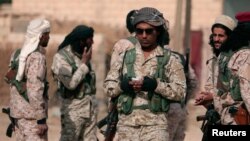A local force of Arab tribesmen in northern Syria has been trained to fight alongside Kurdish fighters who are slowly advancing to recapture Raqqa, the de facto capital of Islamic State, according to Kurdish commanders and tribal leaders.
The Arab force, composed of more than 2,000 men, will fight IS under the command of the U.S.-backed Syrian Democratic Forces (SDF), who are in their second week of a long offensive toward Raqqa.
"These are young men from Raqqa who will be battling [IS] inside the city when our forces get near there," said Nasir Hajji Mansur, a commander with SDF on the front lines, told VOA Monday.
The Arabs are from villages and areas recently cleared of IS north of Raqqa. Many of them come from Raqqa city and fled after IS took over in 2014. They will be wearing the SDF uniforms and using weapons supplied by the Kurds, commanders said.
Many villages cleared
With the help of U.S. air support, the SDF has cleared dozens of villages in northern Raqqa from IS militants. More than 30,000 SDF fighters are in the operation that likely will take months before nearing the limits of Raqqa, Kurdish military sources told VOA. They are about 30 kilometers away from the IS stronghold.
Turkey objects to the Kurdish offensive, however, saying Turkish-backed rebels should take the lead to free Raqqa. Turkey also has voiced objections about the makeup of the SDF, almost two-thirds of which is Kurdish. Some of the most capable and effective of those Kurdish forces are People's Protection Units, or YPG, which Ankara regards as a terrorist organization. The inclusion of non-Kurdish Arab tribesmen in the fight for Raqqa is an attempt to mollify fears that a Kurdish-led offensive could escalate tensions with residents, locals say.
Raqqa had a pre-war population of about 500,000 people with a Sunni Arab majority, but now it is estimated to have around 200,000 people. There have been tensions between Arab and Kurdish groups in the past in some areas after IS has been cleared out, according to locals and Kurdish fighters.
Kurdish troops won't stay
"There is an anti-Kurdish propaganda that says the [Kurds] will carry out abuses against civilians in Raqqa," said Mohammed Shlash, an Arab and former member of the city council in Raqqa.
But Kurdish military officials say their forces do not plan to stay in the city after Raqqa is freed from IS control.
"It makes no sense for us to stay there," Kurdish commander Mansur said. "Once we have liberated Raqqa, a local administration will assume governance."
Kurdish forces also need the expertise of Arab tribesmen, whose ancestors have lived in the region for centuries.
"Kurds have to make sure they don't provoke the locals," said Qusai Hwaidi, a political activist from Raqqa, who regularly advises tribal leaders. "To do so, they need to have the tribes on their side. Only that will guarantee peace in Raqqa after IS."
Meeting in Turkey
U.S. military officials met with their counterparts early this month in Turkey to discuss the Raqqa operation and "to find the right mix of forces" to liberate the city, said U.S. Joint Chiefs of Staff Gen. Joseph Dunford.
The U.S. is sure, however, that Kurdish-led forces are capable of leading the charge.
"We do believe that they have the expertise," U.S. Col. John Dorrian told Pentagon reporters recently.
"They were very successful in developing a plan for the liberation of Manbij," he said of a town in northern Syria freed from IS in August. "And we believe that, certainly, with coalition help, they can do the same in Raqqa."
Kurdish forces withdrew from Manbij weeks after they freed the town from IS fighters.
"Kurdish forces have liberated other Sunni Arab areas such as Manbij where they were welcomed by locals," said Sadradeen Kinno, a Syrian reporter covering developments in Raqqa. "The Raqqa operation will be similar to that in Manbij in this regard."












